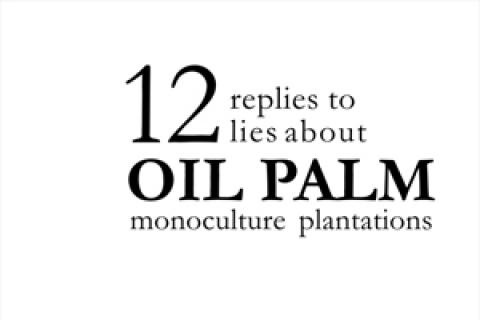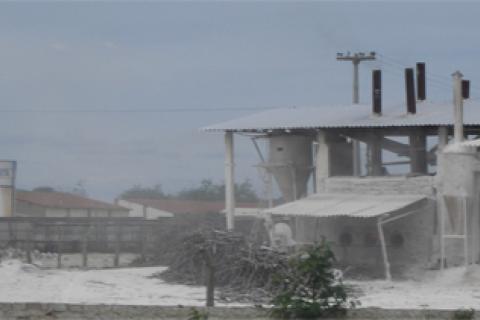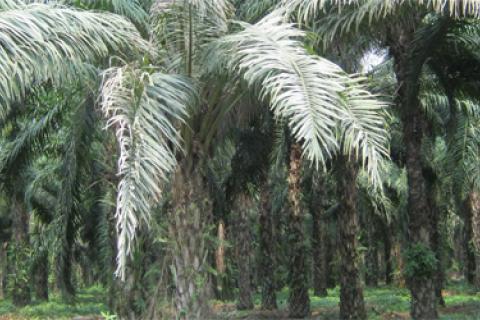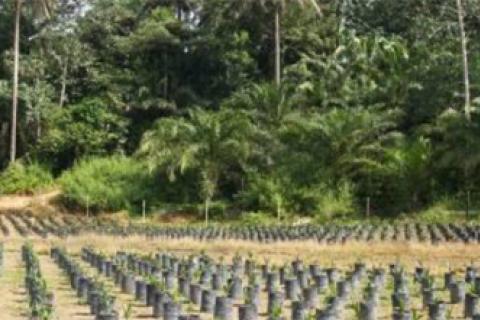Focusing on the claims made by the oil palm industry to “sell” their industrial plantations, the World Rainforest Movement (WRM) has produced a new booklet:
Oil palm: 12 Replies to 12 Lies about Oil Palm monocultures plantations
Other information
"Carbon discredited: why the EU should steer clear of forest carbon offsets", published by FERN and Friends of the Earth France, explains why forest carbon projects fail to provide climate, environment, development or financial gains. The organisations demand that the EU, California and any other carbon markets to steer clear of international forest offset credits. The document is available athttp://www.fern.org/nhambita
“El modelo forestal pinochetista y los intentos expansionistas de irresponsables políticos y empresarios” (The Pinochet forestry model and the expansionist efforts of irresponsible politicians and business owners), by Mapuexpress Informativo Mapuche, an independent news agency operated by a Mapuche indigenous organization. A selection of news stories, opinion pieces and background material related to the discussion of a bill presented by the Chilean government for approval with “great urgency”, which seeks to extend Decree Law 701 for another 20 years.
The Araripe Plateau, as an elevated region, plays a key role in maintaining the local microclimate and in the region’s water cycle. It could also be considered the source of biodiversity in the region known as Sertão do Araripe Pernambucano. It is in this very region that a public-private partnership is promoting monoculture eucalyptus plantations as a source of energy for gypsum production. The public agencies involved are the Agronomic Institute of Pernambuco (IPA) and the Rural Federal University of Pernambuco, with the support of the state and federal governments.
Vietnamese land grabs in Cambodia and Laos for rubber plantations: secrecy, destruction and violence
The characteristics of natural rubber make it a competitive material for industrial and medical uses, but products related to transportation, tyres and tyre products, are by far the largest single end market for natural rubber: they account for over 50% of consumption.
Industrial monoculture oil palm plantations have expanded significantly in Guatemala in recent years. One of the areas that has seen the greatest increase in these plantations is the municipality of Sayaxché, Petén, where companies have determined that the land is optimally suited for oil palm production.
A few corporations will concentrate control of more than 75% of the arable land in the Pujehun district for large-scale industrial agriculture, primarily oil palm plantations depriving local farming communities of their land and trees.
“An overview of industrial tree plantations in the global South: Conflicts, trends and resistance struggles”, EJOLT Report 3, has just been published in Bahasa Indonesia.http://www.wrm.org.uy/publications/EJOLTplantations_Bahasa.pdf
“Walking on Caves of Fire”, by Nnimmo Bassey, records his impressions of the level of impacts from mining in Witbank, Old Coronation mine and other Highveld communities from a field trip in Mpumalanga Province organised by Friends of the Earth South Africa as a prelude to Oilwatch Africa conference that was held in Midrand mid May 2013. http://nnimmo.blogspot.com/2013/05/walking-on-caves-of-fire.html
“Towards a Post-Oil Civilization. Yasunization and other initiatives to leave fossil fuels in the soil”. The EJOLT Report No. 6 traces the birth and growth of the idea of leaving oil in the ground. It also analyses the links between the proposal and the world movement in defense of indigenous peoples as well as discusses the financial aspects of the Yasuni ITT proposal, siding against ‘carbon trading’.
http://www.ejolt.org/wordpress/wp-content/uploads/2013/05
“Genetically Engineered Trees and Bioenergy. A Growing Threat to Forests and Communities”, an updated briefing paper of the Global Justice Ecology Project analyzing the state of GE Trees and bioenergy
http://globaljusticeecology.org/file/Analysis%20of%20the%20State%20o
f%20GE%20Trees%20May%202013.pdf
"La ruina de la fractura hidráulica", a report by Ecologistas en Acción that exposes the truth about the extraction of unconventional gas through hydraulic fracturing or “fracking”.http://www.ecologistasenaccion.org/article25805.html





